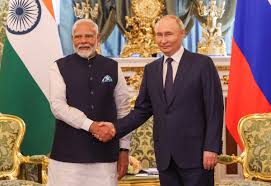Digital News Guru Business Desk:
Reliance and Rosneft Seal Landmark 10-Year Crude Oil Supply Agreement
In a significant development underscoring the deepening energy partnership between India and Russia, Rosneft, Russia’s state-owned oil company, has entered into a monumental agreement with India’s Reliance Industries. This 10-year deal, commencing in January 2025, entails the supply of 500,000 barrels of crude oil per day to Reliance’s Jamnagar refinery complex in Gujarat, the world’s largest refining hub. Valued at approximately $13 billion annually, this agreement marks the largest energy transaction between the two nations to date.

Strategic Significance of the Deal
This agreement holds substantial strategic importance for both countries. For Russia, it secures a stable and substantial market for its crude oil amidst ongoing Western sanctions imposed due to geopolitical tensions. These sanctions have prompted Russia to pivot towards Asian markets, with India emerging as a key partner. For India, the deal ensures a consistent supply of discounted crude oil, aiding in energy security and cost management amid global economic fluctuations.
Economic Implications
The financial magnitude of this deal is noteworthy, with an estimated value of $13 billion per year. This substantial investment reflects the mutual economic benefits anticipated by both nations. For Reliance Industries, access to a steady and discounted supply of crude oil enhances its refining operations’ profitability and efficiency. The Jamnagar complex, being the world’s largest refining hub, stands to gain significantly from this consistent supply line.
Impact on Global Oil Markets
The agreement is poised to influence global oil markets, considering that it accounts for about 0.5% of the world’s daily oil supply. This substantial volume underscores the deal’s potential to affect global oil prices and trade flows. Additionally, it signifies a shift in global energy alliances, with India and Russia strengthening their economic ties despite Western efforts to isolate Russia economically.

Historical Context of India-Russia Energy Relations
The energy sector has long been a cornerstone of India-Russia relations. In 2001, ONGC Videsh acquired a 20% stake in the Sakhalin-I oil and gas project in Russia, marking a significant investment in the Russian energy sector. Over the years, both nations have collaborated on various energy projects, including nuclear energy cooperation exemplified by the Kudankulam Nuclear Power Project. This latest deal between Rosneft and Reliance Industries represents a continuation and expansion of this longstanding energy partnership.
Geopolitical Considerations
The timing and scale of this agreement carry significant geopolitical implications. India’s decision to engage in such a substantial deal with Russia, despite Western sanctions, reflects its strategic autonomy and commitment to pursuing national interests. This move aligns with India’s broader foreign policy approach of maintaining balanced relations with major global powers while safeguarding its energy security and economic interests.
Potential Challenges and Considerations
Despite the mutual benefits, the deal may face challenges, including trade imbalances and potential complications with non-dollar settlements, especially if there are shifts in U.S. political stances. Additionally, the long-term commitment may limit Rosneft’s ability to supply other buyers, potentially affecting its market flexibility.

Conclusion
In a landmark development, Russia’s state-owned oil company Rosneft has entered into a 10-year agreement with India’s Reliance Industries to supply 500,000 barrels of crude oil per day, valued at approximately $13 billion annually. The Rosneft-Reliance agreement marks a significant milestone in India-Russia energy relations, reflecting a pragmatic approach by both nations to navigate the complex geopolitical landscape. As the deal unfolds, it will be crucial to monitor its impact on global energy markets and the broader geopolitical dynamics
You May Also Read: Top OTT Releases to Watch in December 2024: From Squid Game to Singham Again








